<systemConfiguration>
...
<adminGuiConfiguration>
....
<objectDetails>
<objectDetailsPage>
<type>UserType</type> (1)
<panel>
<identifier>assignments</identifier>
<panel>
<identifier>allAssignments</identifier> (2)
<listView>
<dataProvider xsi:type="RepositoryAssignmentDataProviderType"/> (3)
</listView>
</panel>
</panel>
</objectDetailsPage>
</objectDetails>
</adminGuiConfiguration>
...
</systemConfiguration>GUI: Assignment Repository Search
|
Since 4.6
This functionality is available since version 4.6.
|
Background Information
When displaying assignments, midPoint - by default - uses so-called in-memory search. It is faster but has various limitations: The main one is that it is not possible to formulate advanced queries, like "show only assignments of roles whose names contain specified text". However, since midPoint 4.6 the repository-based search is available as an alternative.
Enabling Repository Search for an Assignments Panel
By default, all assignments panels use in-memory search.
The repository-based search is enabled per object type and per assignment panel. It is done by
adding or editing adminGuiConfiguration → objectDetails → objectDetailsPage section
in the system configuration.
The following example illustrates how to enable repository-based search for the panel that shows all assignments of a user.
| 1 | Causes this configuration to be applied to user assignments |
| 2 | Denotes "all assignments" panel |
| 3 | The most important part: enables repository-based search |
If you already have configuration for User object details page, you should merge this into your
existing configuration.
As it is obvious from the configuration example, this configuration is per object type.
If you want repository-based search for assignments of other object types, you need to add
objectDetailsPage configuration for each of them.
|
For additional existing assignment panels and their GUI configuration see Admin GUI Configuration.
After saving these changes, you should log out and log in again. Otherwise, the changes would not be applied to your GUI session.
Enabling Full-Text Search
The repository search provider allows you to use full-text search in assignment panels. In order to use this feature, full-text indexing must be enabled system-wide. Please see Full-Text Search for details.
For clarity of search for end-users, we recommend setting full-text indexing at least for the following properties:
| Type | Property | Description |
|---|---|---|
|
|
Target name displayed for most assignments. |
|
|
Alternative name displayed for roles and services (if present). |
The following configuration snippet indexes name for all AssignmentHolderType objects
(i.e. almost all objects in the system) and additionally displayName and description
for all abstract roles. It is to be put into the system configuration object at the root level.
(Do not forget to reindex the repository after including it.)
<fullTextSearch>
<enabled>true</enabled>
<indexed>
<objectType>AssignmentHolderType</objectType>
<item>name</item>
</indexed>
<indexed>
<objectType>AbstractRoleType</objectType>
<item>displayName</item>
<item>description</item>
</indexed>
</fullTextSearch>An Example of Full-Text Search
Let us have a user test with the following five role assignments:
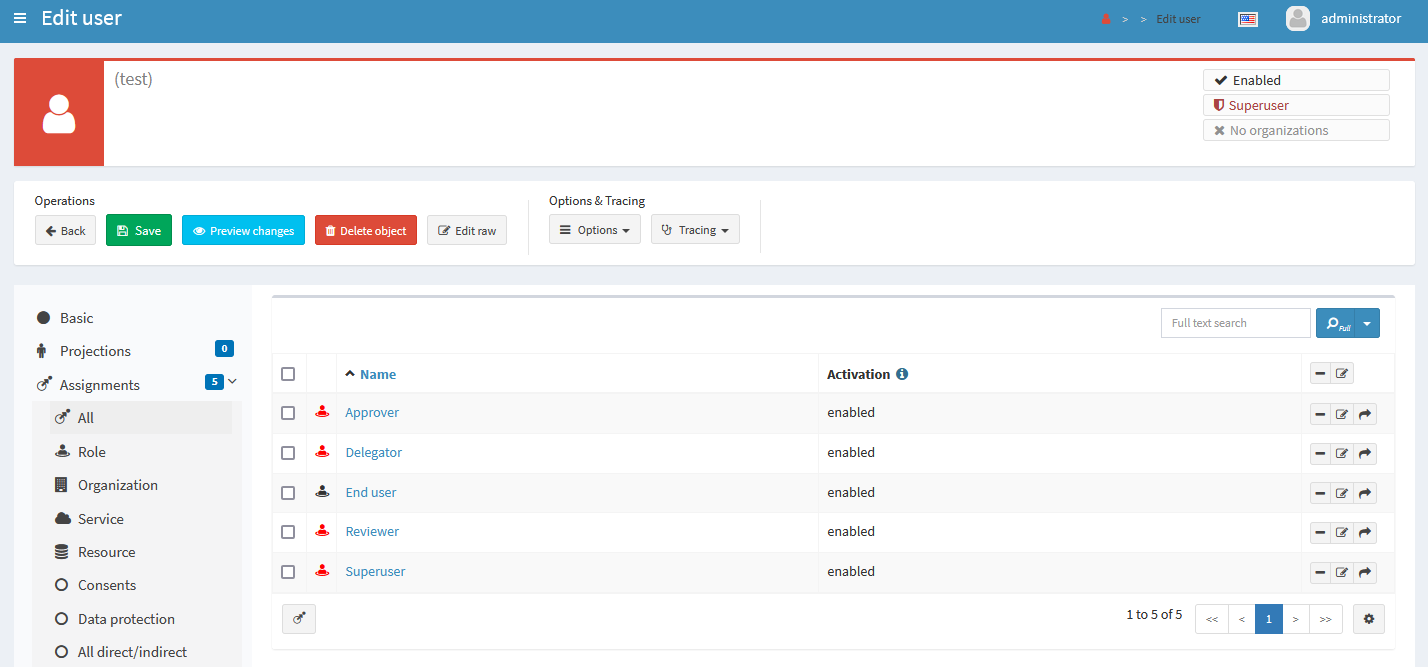
After entering approver into the full-text search box the Approver role assignment is shown:
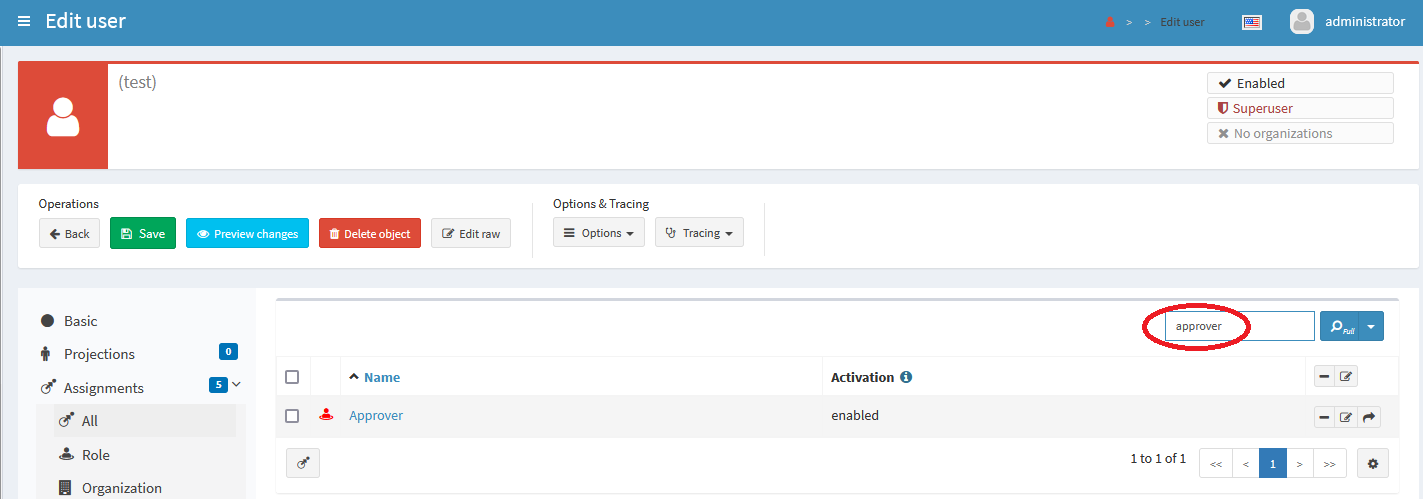
After entering decisions into the full-text search box the Approver and Reviewer assignments
are shown:
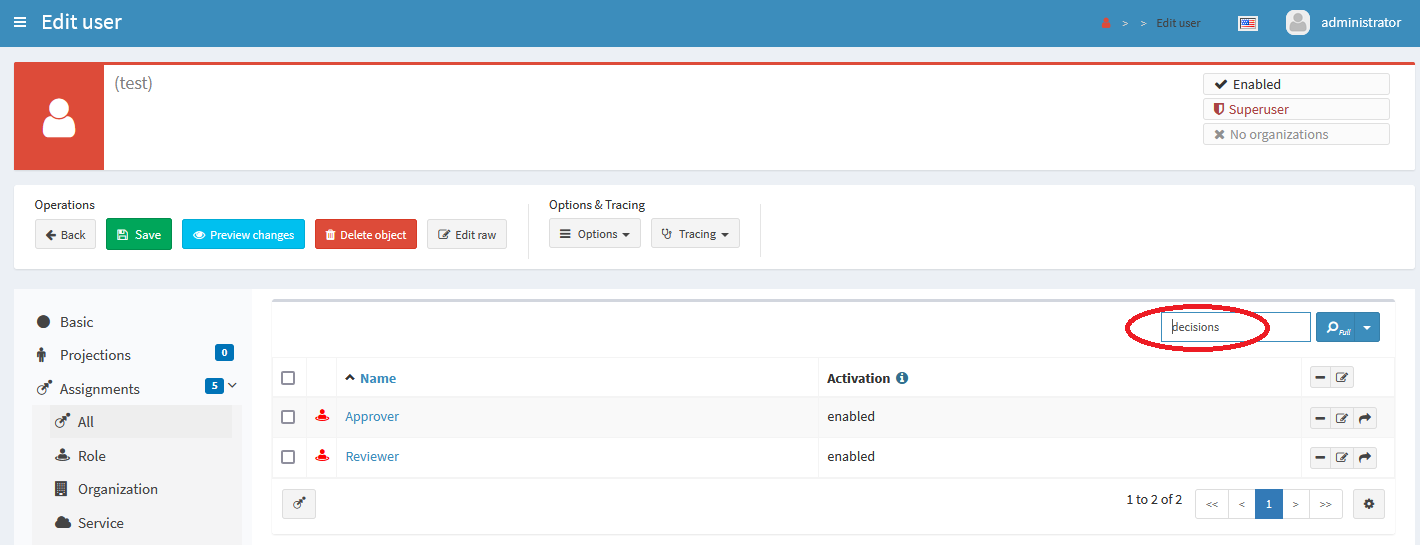
It is because they have the description of "Role authorizing users to make approval decisions on
work items." and "Role authorizing users to make decisions on certification cases.", respectively.
Only those two objects contain the word decisions in their full-text indexed properties.
Full-Text Search Limitations
The full-text search currently matches only properties of the target object, e.g. the role that is assigned to the user. The properties of the assignment itself (e.g. the description of the assignment) are not searchable by this feature.
Adding Extension Properties to Assignments
MidPoint supports extending the structure of assignments, just like it does for ordinary objects.
Extending the Schema
For example, the following extension.xsd file (put into the schema directory in midPoint home)
adds a string property named reason to an assignment. It may denote the reason why the
assignment has been created.
For role, this schema defines additional string property externalName, which may
denote role name as intended for external systems.
extension.xsd file<xsd:schema elementFormDefault="qualified"
targetNamespace="http://example.com/xml/ns/mySchema"
xmlns:a="http://prism.evolveum.com/xml/ns/public/annotation-3"
xmlns:c="http://midpoint.evolveum.com/xml/ns/public/common/common-3"
xmlns:xsd="http://www.w3.org/2001/XMLSchema">
<xsd:complexType name="AssignmentExtensionType">
<xsd:annotation>
<xsd:appinfo>
<a:extension ref="c:AssignmentType"/>
</xsd:appinfo>
</xsd:annotation>
<xsd:sequence>
<xsd:element name="reason" type="xsd:string" minOccurs="0" maxOccurs="1">
<xsd:annotation>
<xsd:appinfo>
<a:indexed>true</a:indexed>
<a:displayName>Assignment Reason</a:displayName>
<a:displayOrder>120</a:displayOrder>
</xsd:appinfo>
</xsd:annotation>
</xsd:element>
</xsd:sequence>
</xsd:complexType>
<xsd:complexType name="RoleExtensionType">
<xsd:annotation>
<xsd:appinfo>
<a:extension ref="c:RoleType"/>
</xsd:appinfo>
</xsd:annotation>
<xsd:sequence>
<xsd:element name="externalName" type="xsd:string" minOccurs="0" maxOccurs="1">
<xsd:annotation>
<xsd:appinfo>
<a:indexed>true</a:indexed>
<a:displayName>External Name</a:displayName>
<a:displayOrder>120</a:displayOrder>
</xsd:appinfo>
</xsd:annotation>
</xsd:element>
</xsd:sequence>
</xsd:complexType>
</xsd:schema>Note that it’s necessary to restart midPoint after augmenting or changing the extension schema, e.g. by adding a file like this one.
Making Custom Property Visible in Assignment List
We can add custom columns to the assignment panel by modifying panel→listView item in the
admin GUI configuration.
<systemConfiguration>
...
<adminGuiConfiguration>
....
<objectDetails>
<objectDetailsPage>
<type>UserType</type>
<panel>
<identifier>assignments</identifier>
<panel>
<identifier>allAssignments</identifier>
<listView>
...
<includeDefaultColumns>true</includeDefaultColumns> (1)
<column> (2)
<name>reason</name> (3)
<path>extension/reason</path> (4)
</column>
</listView>
</panel>
</panel>
</objectDetailsPage>
</objectDetails>
</adminGuiConfiguration>
...
</systemConfiguration>| 1 | Setting this to true preserves original default columns, so we do not need to redeclare them. |
| 2 | Adds the column definition |
| 3 | Name (identifier) of the column |
| 4 | Item path of the data to be displayed in the column. In this case it is extension/reason. |
| Do not forget to log out and log in after this change, to make it effective. |
Now, we can put values into this property, e.g. like this:
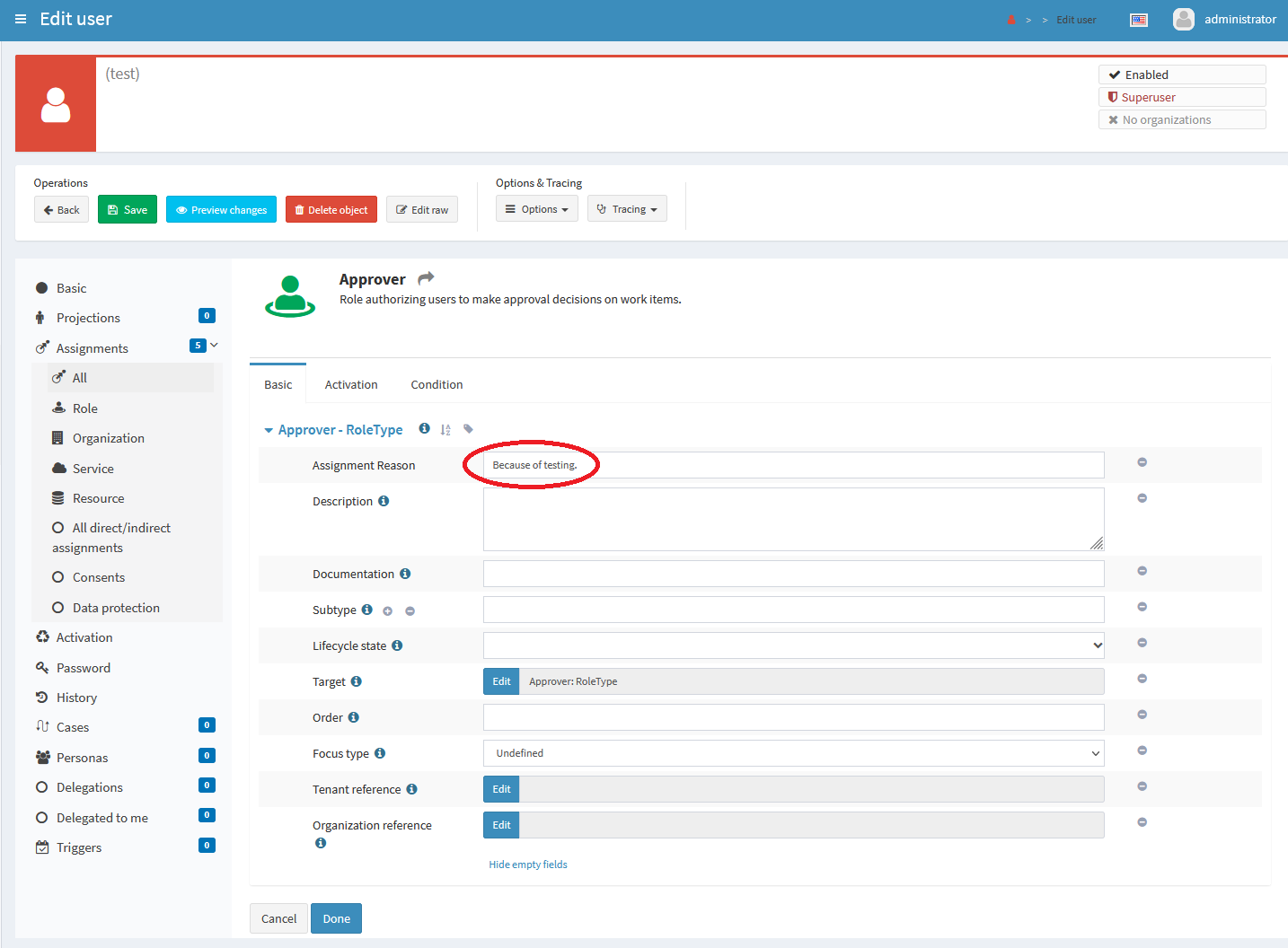
We may do the same for e.g. Superuser assignment, leading to:
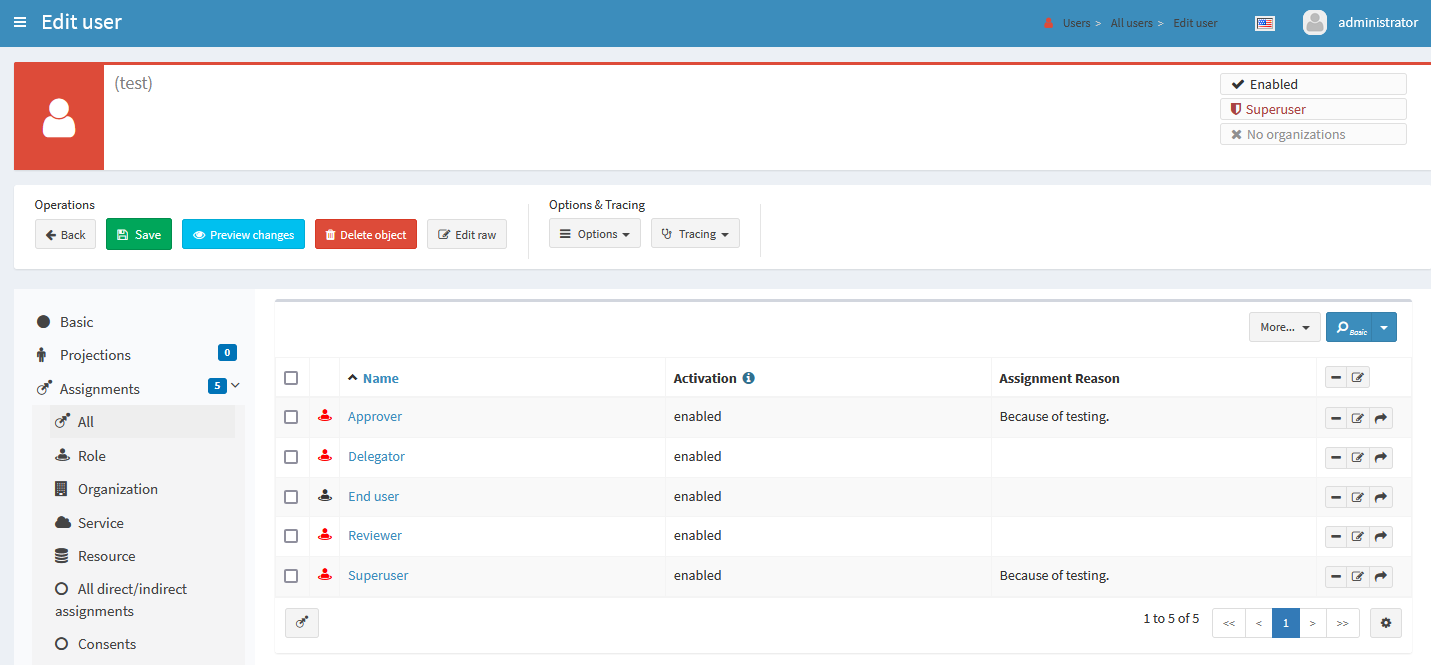
Now, if the repository search is enabled, we can also search in indexed assignment extension fields. It is necessary to use either Advanced Search or Axiom Query Search feature for this.
For example:
<filter>
<substring>
<path>extension/reason</path>
<value>testing</value>
</substring>
</filter>extension/reason contains "testing"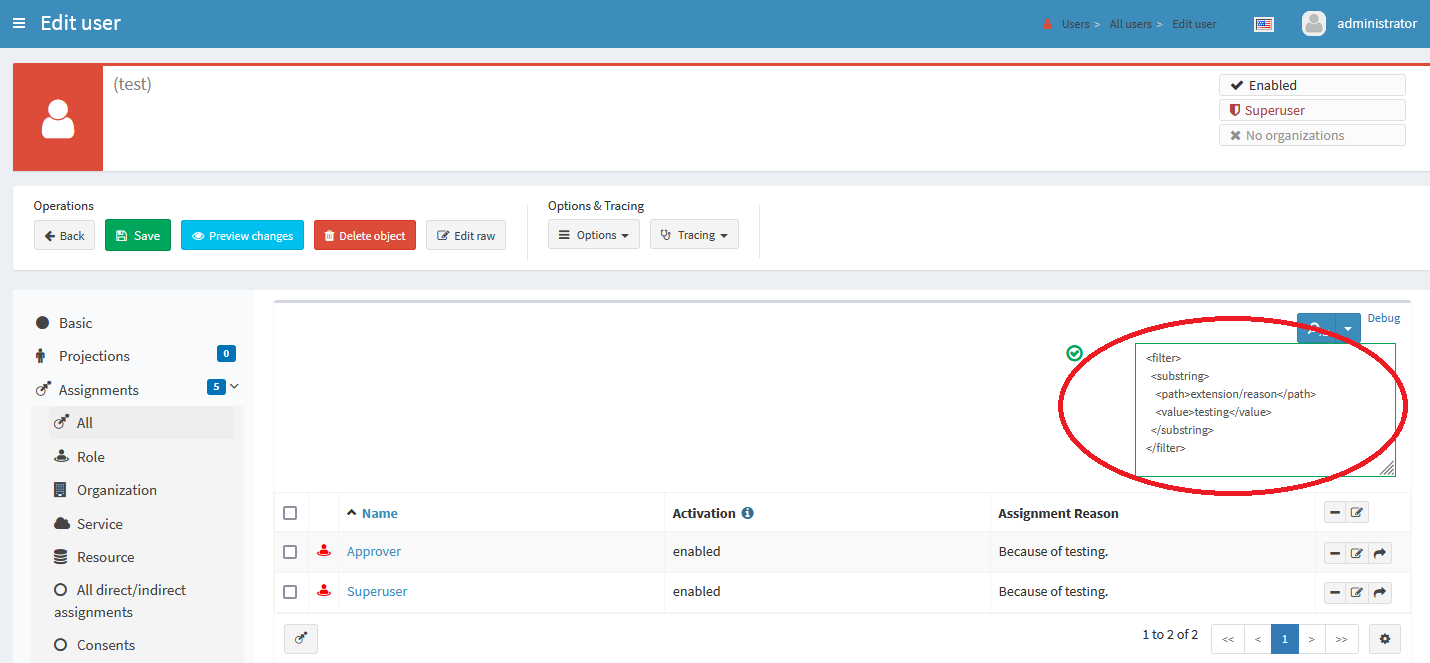
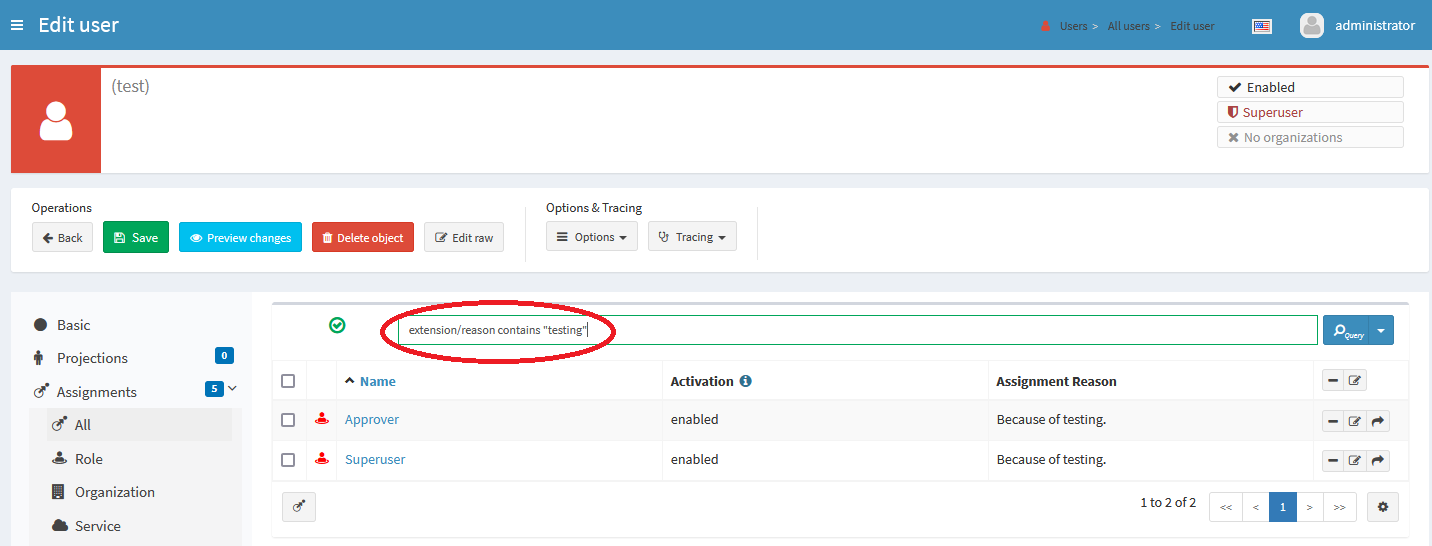
| Because of current limitations (see the end of this guide) it is necessary to save the user object before being able to search for its assignments' properties. |
Other examples of using advanced or Axiom search are in later parts of this guide.
Making Custom Column Sortable
By default, the assignments are sorted alphabetically by the target name. (See the list of current limitations for the issues connected to using display names in objects shown, when sorting according to name is used.)
However, it is possible to make our custom column sortable (again, if we are using
RepositoryAssignmentDataProvider) by declaring sortProperty for column.
The sort property is still an experimental feature, so syntax for declaration is a bit complex: it is in the form of item path with full namespace declarations.
As an example, if we want to enable sorting on our extension reason property, we need to have
the following column definition in panel→listView section.
<column>
<name>reason</name>
<path>extension/reason</path>
<sortProperty>
declare namespace myext="http://example.com/xml/ns/mySchema";
extension/myext:reason
</sortProperty>
</column>| This feature is currently not available in some configurations. This is going to be fixed. |
Adding columns displaying assignment target data
It is possible to add custom columns, which displays data from assignment target and it’s extension, but there are some limitations, based on assignment panel type.
- All -
allAssignments -
panel and code assumes that target is
AbstractAssignmentHolderType. If you want to add column which display target extension forRoleType,OrgTypeorServiceTypeyou need to use column with expressions. This columns can not be sortable. - Role -
roleAssignments -
panel and code assumes that target is
RoleTypeand contains extension data forRoleType. - Organizations -
orgAssignments -
panel and code assumes that target is
OrgType - Service -
serviceAssignments -
panel and code assumes that target is
ServiceType
Adding column displaying information from reference itself (name or OID)
name of target (not display name)<column>
<name>targeName</name>
<path>targetRef</path>
<export>
<expression>
<script>
<code>input.targetName</code>
</script>
</expression>
</export>
</column>oid of target<column>
<name>targetOid</name>
<path>targetRef</path>
<export>
<expression>
<script>
<code>input.oid</code>
</script>
</expression>
</export>
</column>Adding target extension column for concrete type panels
| This works only on assignment panels wit concrete target (Role, Organization, Service) and Repository search must be enabled. |
For concrete type panels adding column, which displays target extension is straight-forward and similar to adding normal custom column.
If our schema has indexed extension property named externalName defined for RoleType, we are able to add it as column to Assignments → Role panel.
The path for this property (relative to assignment) is targetRef/@/extension/externalName.
externalName extension from target.<column>
<name>extName</name>
<path>targetRef/@/extension/externalName</path>
</column>If we want to make this column also sortable, we need to add sortProperty to column.
externalName extension from target.<column>
<name>extName</name>
<path>targetRef/@/extension/externalName</path>
<sortProperty>targetRef/@/extension/externalName</sortProperty>
</column>Adding target extension column to All Assignments panel
Since not all target types may contain extension (if it is defined in concrete type for example), adding column is bit trickier and require use of script expression and more verbose column definition. Since the extension property is not present in all possible
assignment target types we can not sort by it.
We can display our custom property externalName also on allAssignments panel, using
following snippet:
<column>
<name>externalName</name>
<path>targetRef/@</path> (1)
<display>
<label>External Name</label> (2)
</display>
<export>
<expression>
<script>
<code>
basic.getExtensionPropertyValue(input, "http://example.com/xml/ns/mySchema", "systemType") (3)
</code>
</script>
</expression>
</export>
</column>| 1 | In this case target must be whole target object (targetRef/@) |
| 2 | Since this column is custom column using expressions, we also need to define display name of column |
| 3 | We can use basic expression functions to get extension property. The function getExtensionPropertyValue has arguments object (in case of simple expression it is input), namespace and local name of extension property. |
Using Advanced or Axiom Search Feature
It is possible to formulate advanced queries using either Advanced (XML) or Axiom Search.
In the case of assignments, you are able to perform queries that deal with both assignment data
and assignment target data. The latter are accessed via so-called dereferencing using special
path component @.
| You can learn more about filters and dereferencing in Query Documentation. |
Let us have a look at some examples.
user<filter>
<substring>
<path>targetRef/@/name</path>
<value>user</value>
</substring>
</filter>targetRef/@/name contains "user"<filter>
<equal>
<path>targetRef/@/roleMembershipRef/@/name</path>
<value>System role</value>
</equal>
</filter>targetRef/@/roleMembershipRef/@/name = "System role"Note that we are looking for all assignments targeting an object that is itself a member of System role
object - assuming that System role is an archetype. There are currently four such assignments: all except
End user-targeted one.
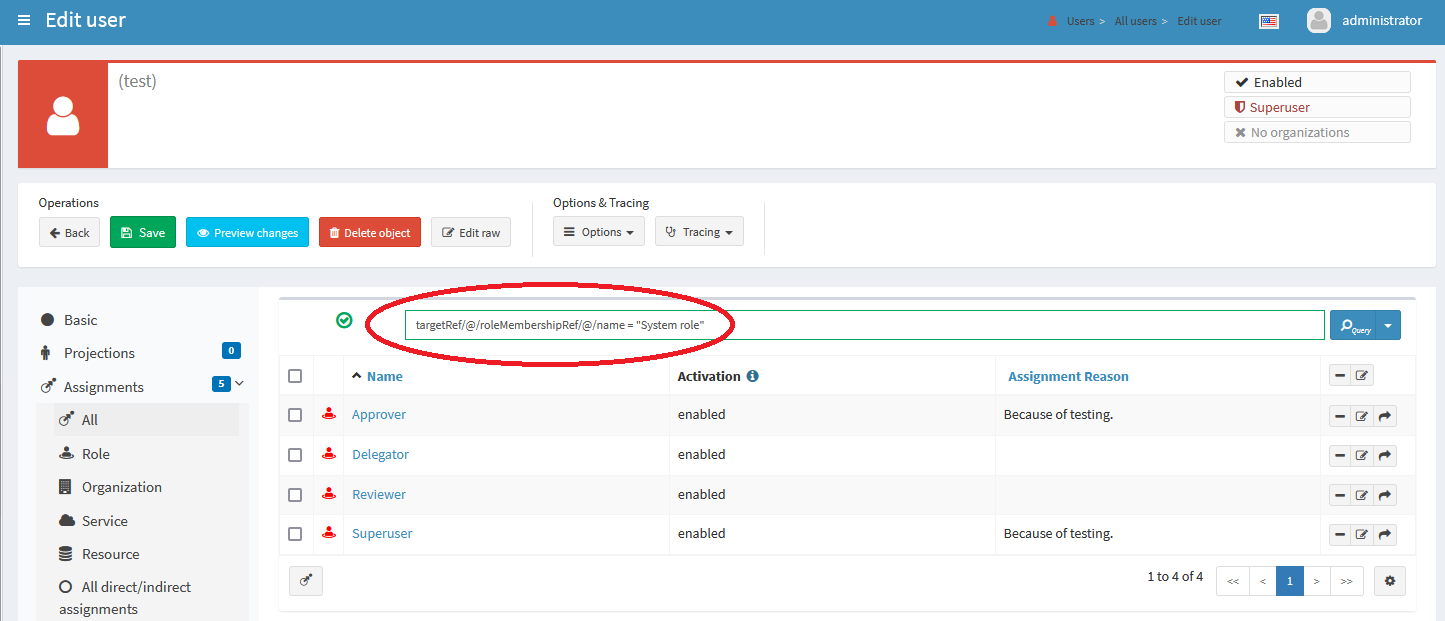
When considering the available properties for search, take into account that the root object
for queries in this panel is AssignmentType. So you may open the schema definition for this object,
and refer to all its indexed properties (i.e. present in the repository).
|
Current Limitations
The following are current limitations of repository-based search in assignment views. (Some of them have been already mentioned in this guide.)
-
New (i.e. unsaved) assignments are not being filtered. All of them are always displayed at start of the list using the green color, regardless of whether they match the search filter, or not. The reason is that they are not yet present in the repository.
-
For the same reason, any changes made to the assignments and not yet saved into the repository are not reflected in the filtering results. For example, if you search for the
extension/reasonproperty of the assignment, any changes made to this property are reflected in the search result only after the user object is saved into the repository. -
Assignment lists sorted by
Namemay appear unsorted ifDisplay Nameof the target object (e.g. role) is different from itsName. (The combined sort based on name and display name is not supported.) -
When sorting according to an extension property, the property must be declared as single-valued (
maxOccurs= 1, which is the default in XSD). This is quite logical, as sorting according to multivalued property is - in principle - undefined. -
Full-text search is performed on target of an assignment (e.g. assigned role) only. The content of assignment itself is not indexed for full-text search.
-
We recommend to enable repository-based search only on
allAssignments,roleAssignments,serviceAssignmentsororgAssignmentspanels, since other panels rely on in-memory search.